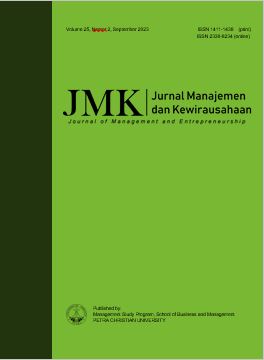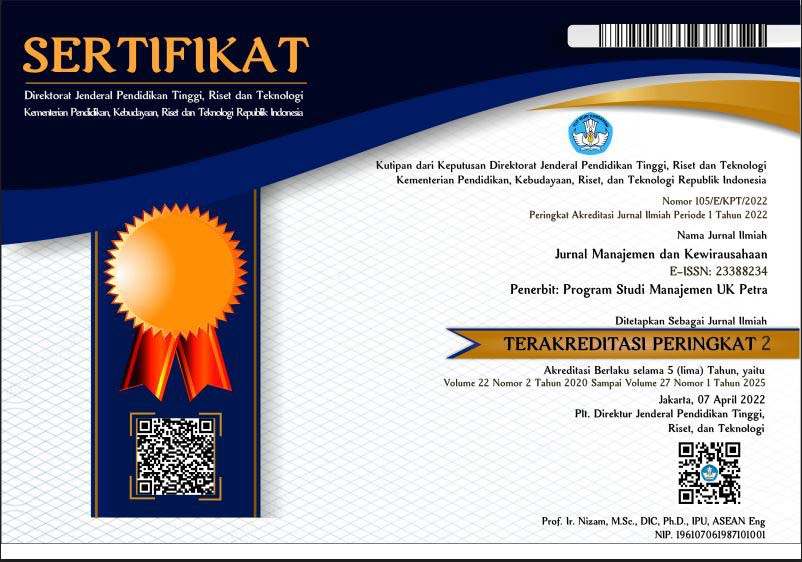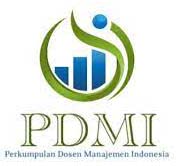HUMAN vs. ROBOT: THE APPLICATION OF SMART TECHNOLOGY IN THE HOTEL INDUSTRY
DOI:
https://doi.org/10.9744/jmk.25.2.142-151Abstract
The current use of robotics, artificial intelligence, and service automation (RAISA) illustrated that innovation developed very quickly and had an enormous impact on how consumers use tourism services. This study aimed to determine how tourism and hospitality employees dealt with the pandemic, particularly when implementing the protocol called physical distance in the new normal era. This study also intended to discover our hospitality industry's readiness to confront a new normal era by applying technology to serve guests. This study conducted semi-structured interviews with 15 stakeholders. The findings indicated that the government and hotel management exploit this occurrence to enhance service quality, explicitly emphasizing hotel consumer comfort and safety. It was posited that the issues associated with the interaction between humans and robots extend beyond budgetary considerations, readiness, and maintenance. A crucial aspect to consider was robots' potential replacement of service uniqueness, particularly in developing countries. Integrating robotics and artificial intelligence (AI) inside the hotel industry may need to reevaluate the hospitality and tourism education curriculum.
References
Acquila-Natale, E., Chaparro-Peláez, J., Del-Río-Carazo, L., & Cuenca-Enrique, C. (2022). Do or Die? The effects of COVID-19 on channel integration and digital transformation of large clothing and apparel retailers in Spain. Journal of Theoretical and Applied Electronic Commerce Research, 17(2), 439–457. https://doi.org/10.3390/jtaer17020023
Ajmal, M. M., Khan, M., Shad, M. K., AlKatheeri, H., & Jabeen, F. (2023). Empirical examination of societal, financial and technology-related challenges amid COVID-19 in service supply chains: Evidence from emerging market. The International Journal of Logistics Management, 34(4), 994–1019. https://doi.org/10.1108/IJLM-04-2021-0220
Aldao, C., Blasco, D., Poch-Espallargas, M., & Palou-Rubio, S. (2021). Modelling the crisis management and impacts of 21st century disruptive events in tourism: The case of the COVID-19 pandemic. Tourism Review, 76(4), 929–941. https://doi.org/10.1108/TR-07-2020-0297
Ammirato, S., Felicetti, A. M., Linzalone, R., & Carlucci, D. (2022). Digital business models in cultural tourism. International Journal of Entrepreneurial Behaviour and Research, 28(8), 1940–1961. https://doi.org/10.1108/IJEBR-01-2021-0070
Azis, N., Amin, M., Chan, S., & Aprilia, C. (2020). How smart tourism technologies affect tourist destination loyalty. Journal of Hospitality and Tourism Technology, 11(4), 603–625. https://doi.org/10.1108/JHTT-01-2020-0005
Barbosa-Neves, B., Wilson, J., Sanders, A., & Kokanović, R. (2023). Using crystallization to understand loneliness in later life: Integrating social science and creative narratives in sensitive qualitative research. Qualitative Research, 23(1), 38–54. https://doi.org/10.1177/1468794121100 5943
Bazeley, P., & Jackson, K. (2019). Qualitative data analysis with NVIVO (3rd ed.). London: SAGE Publications Ltd.
Bell, E., Bryman, A., & Harley, B. (2019). Business research methods (5th ed). Oxford, UK: Oxford University Press.
Bowen, J., & Morosan, C. (2018). Beware hospitality industry: The robots are coming. Worldwide Hospitality and Tourism Themes, 10 (6), 726–733. https://doi.org/10.1108/WHA TT-07-2018-0045
Bryman, A. (2012). Social research methods (4th ed.). New York City, NY: Oxford University Press.
Brinkman, S., & Kvale, S. (2015). InterViews: Learning the craft of qualitative research interviewing (3rd ed.). Los Angeles, CA: SAGE.
Buhalis, D. (2020). Technology in tourism-from information communication technologies to eTourism and smart tourism towards ambient intelligence tourism: A perspective article. Tourism Review, 75(1), 267–272. https://doi.org/10.1108/TR-06-2019-0258
Buhalis, D., Harwood, T., Bogicevic, V., Viglia, G., Beldona, S., & Hofacker, C. (2019). Technological disruptions in services: Lessons from tourism and hospitality. Journal of Service Management, 30(4), 484–506. https://doi.org/10.1108/JOSM-12-2018-0398
Buhalis, D., Leung, D., & Lin, M. (2023). Metaverse as a disruptive technology revolutionising tourism management and marketing. Tourism Management, 97, 104724. https://doi.org/10.1016/j.tourman.2023.104724
Buhalis, D., Papathanassis, A., & Vafeidou, M. (2022). Smart cruising: Smart technology applications and their diffusion in cruise tourism. Journal of Hospitality and Tourism Technology, 13(4), 626–649. https://doi.org/10.1108/JHTT-05-2021-0155
Campbell, S., Greenwood, M., Prior, S., Shearer, T., Walkem, K., Young, S., Bywaters, D., & Walker, K. (2020). Purposive sampling: Complex or simple? Research case examples. Journal of Research in Nursing, 25(8), 652–661. https://doi.org/10.1177/1744987120927206
Choi, Y., Choi, M., Oh, M., & Kim, S. (2020). Service robots in hotels: Understanding the service quality perceptions of human-robot interaction. Journal of Hospitality Marketing & Management, 29(6) 1–23. https://doi.org/10.1080/19368623.2020.1703871
Creswell, J. W. (2014). Research design: Qualitative, quantitative, & mixed method approaches (4th ed.). SAGE.
de Souza, J., Mendes-Filho, L., & Buhalis, D. (2019). Evaluating the effectiveness of tourist advertising to improve the competitiveness of destination. Tourism Economics, 26 (6), https://doi.org/10.1177/1354816619846 748
Erol, I., Neuhofer, I. O., Dogru (Dr. True), T., Oz¬tel, A., Searcy, C., & Yorulmaz, A. C. (2022). Improving sustainability in the tourism industry through blockchain technology: Challenges and opportunities. Tourism Management, 9, 104628. https://doi.org/10.1016/j.tourman.2022.104628
Fourie, J., & Santana-Gallego, M. (2022). Megasport events and inbound tourism: New data, methods and evidence. Tourism Management Perspectives, 43, 101002. https://doi.org/10.1016/j.tmp.2022.101002
Gibson, W. J., & Brown, A. (2009). Working with qualitative data. London: SAGE publications Ltd.
Gossling, S., Scott, D., & Hall, C. M. (2021). Pandemics, tourism, and global change: A rapid assessment of COVID-19. Journal of Sustainable Tourism, 29(1), 1–20, https://doi.org/10.1080/09669582.2020.1758708
Han, D., Hou, H. (Cynthia), Wu, H., & Lai, J. H. K. (2021). Modelling tourists’ acceptance of hotel experience-enhancement smart technologies. Sustainability, 13(8), 4462. https://doi.org/10.3390/su13084462
Ivanov, S. (2020). The impact of automation on tourism and hospitality jobs. Information Technology & Tourism, 22, 205–215. https://doi.org/10.1007/s40558-020-00175-1
Ivanov, S., & Webster, C. (2019). Robots in tourism: A research agenda for tourism economics. Tourism Economics, 26(7), 1065–1085. https://doi.org/10.1177/1354816619879583
Japutra, A., & Situmorang, R. (2021). The repercussions and challenges of COVID-19 in the hotel industry: Potential strategies from a case study of Indonesia. International Journal of Hospitality Management, 95, 102890. https://doi.org/10.1016/j.ijhm.2021.102890
Kim, J. J., & Han, H. (2020). Hotel of the future: Exploring the attributes of a smart hotel adopting a mixed-methods approach. Journal of Travel & Tourism Marketing, 37(7), 804–822. https://doi.org/10.1080/10548408.2020.1835788
Kim, J. J., & Han, H. (2022). Hotel service innovation with smart technologies: Exploring consumers’ readiness and behaviors. Sustainability, 14(10), 5746. https://doi.org/10.3390/su14105746
Kim, S. (Sam), Kim, J., Badu-Baiden, F., Giroux, M., & Choi, Y. (2021). Preference for robot service or human service in hotels? Impacts of the COVID-19 pandemic. International Journal of Hospitality Management, 93, 102 795. https://doi.org/10.1016/j.ijhm.2020.102795
Li, P., Zhou, Y., & Huang, S. (2023). Role of information technology in the development of etourism marketing: A contextual suggestion. Economic Analysis and Policy, 78, 307–318. https://doi.org/10.1016/j.eap.2023.03.010
Lincoln, Y. S., & Guba, E. Naturalistic inquiry. Beverly Hills, CA: SAGE.
Park, S., Kwun, D. J., Park, J.-Y., & Bufquin, D. (2022). Service quality dimensions in hotel service delivery options: Comparison between human interaction service and self-service technology. International Journal of Hospitality & Tourism Administration, 23(5), 931–958. https://doi.org/10.1080/15256480.2021.1935392
Patiro, S. P. S., Hendarto, K. A., Hendrian, H., Budiyanti, H., Al-Hasan, R., Yumantoko, Y., Nur, A., Kurniawan, E., Yuniarti, N., Desmiwati, D., Wisudayati, T. A., Cahyono, D. D. N., Pratama, Y. S. A., Nugraheni, Y. M. M. A., & Yatma, T. D. N. (2023). Stakeholders’ attitude toward ecotourism development in Rinjani-Lombok geopark: The evidence from Mount Rinjani national park. Jurnal Manajemen dan Kewirausahaan, 25(1), 41–54. https://doi.org/10.9744/jmk.25.1.41-54
Pillai, S. G., Haldorai, K., Seo, W. S., & Kim, W. G. (2021). COVID-19 and hospitality 5.0: Redefining hospitality operations. International Journal of Hospitality Management, 94, 102869. https://doi.org/10.1016/j.ijhm.2 021.102869
Reis, J., Melao, N., Salvadorinho, J., Soares, B., & Rosete, A. (2020). Service robots in the hospitality industry: The case of Hennna hotel, Japan. Technology in Society, 63, 1014 23. https://doi.org/10.1016/j.techsoc.2020.101423
Robinson, R. N. S., Solnet, D. J., & Breakey, N. (2014). A phenomenological approach to hospitality management research: Chefs’ occupational commitment. International Journal of Hospitality Management, 43, 65–75. https://doi.org/10.1016/j.ijhm.2014.08.004
Robson, C. (2011). Real world research (3rd ed.). Wiley.
Shen, S., Sotiriadis, M., & Zhang, Y. (2020). The influence of smart technologies on customer journey in tourist attractions within the smart tourism management framework. Sustain¬ability, 12(10), 4157. https://doi.org/10.3390/su12104157
Silverman, D. (2010). Doing qualitative research (3rd ed.). London: SAGE.
Silverman, D. (2013). Doing qualitative research (4th ed.). London: SAGE.
Situmorang, R., & Japutra, A. (2024). Knowledge transfer within MNC hotel subsidiaries: An absorptive capacity perspective. Tourism Management, 100, 104794. https://doi.org/10.1016/j.tourman.2023.104794
Song, B., Zhang, M., & Wu, P. (2022). Driven by technology or sociality? Use intention of service robots in hospitality from the human-robot interaction perspective. International Journal of Hospitality Management, 106, 10 3278. https://doi.org/10.1016/j.ijhm.2022.103278
Sun, S., Lee, P. C., Law, R., & Zhong, L. (2020). The impact of cultural values on the acceptance of hotel technology adoption from the perspective of hotel employees. Journal of Hospitality and Tourism Management, 44, 61–69. https://doi. org/10.1016/j.jhtm.2020.04.012
Waller, G., & Abbasian, S. (2022). An assessment of crisis management techniques in hotels in London and Stockholm as response to COVID-19’s economic impact. International Journal of Contemporary Hospitality Management, 34(6), 2134–2153. https://doi.org/10.1108/IJCHM-08-2021-1007
Xu, S., Steinmetz, J., & Ashton, M. (2020). How will service robots redefine leadership in hotel management? A Delphi approach. International Journal of Contemporary Hospitality Management, 32(6), 2217–2237. https://doi.org/10. 108/ijchm-05-2019-0505
Yang, H., Song, H., Cheung, C., & Guan, J. (2021). How to enhance hotel guests’ acceptance and experience of smart hotel technology: An examination of visiting intentions. International Journal of Hospitality Management, 97, 103000. https://doi.org/10.1016/j.ijhm.2021.103000
Yousaf, S. (2021). Travel burnout: Exploring the return journeys of pilgrim-tourists amidst the COVID-19 pandemic. Tourism Management, 84, 104285. https://doi.org/10.1016/j.tourman.2021.104285
Zhang, H., Song, H., Wen, L., & Liu, C. (2021). Forecasting tourism recovery amid COVID-19. Annals of Tourism Research, 87, 103149. https://doi.org/10.1016/j.annals.2021.103149
Downloads
Published
How to Cite
Issue
Section
License
Authors who publish on this journal agree to the following terms:
- Authors retain copyright and grant the journal right of first publication with the work simultaneously licensed under a Creative Commons Attribution License that allows others to share the work with an acknowledgement of the work's authorship and initial publication in this journal.
- Authors are able to enter into separate, additional contractual arrangements for the non-exclusive distribution of the journal's published version of the work (e.g., post it to an institutional repository or publish it in a book), with an acknowledgement of its initial publication in this journal.
- Authors are permitted and encouraged to post their work online (e.g., in institutional repositories or on their website) prior to and during the submission process, as it can lead to productive exchanges, as well as earlier and greater citation of published work (See The Effect of Open Access).


















